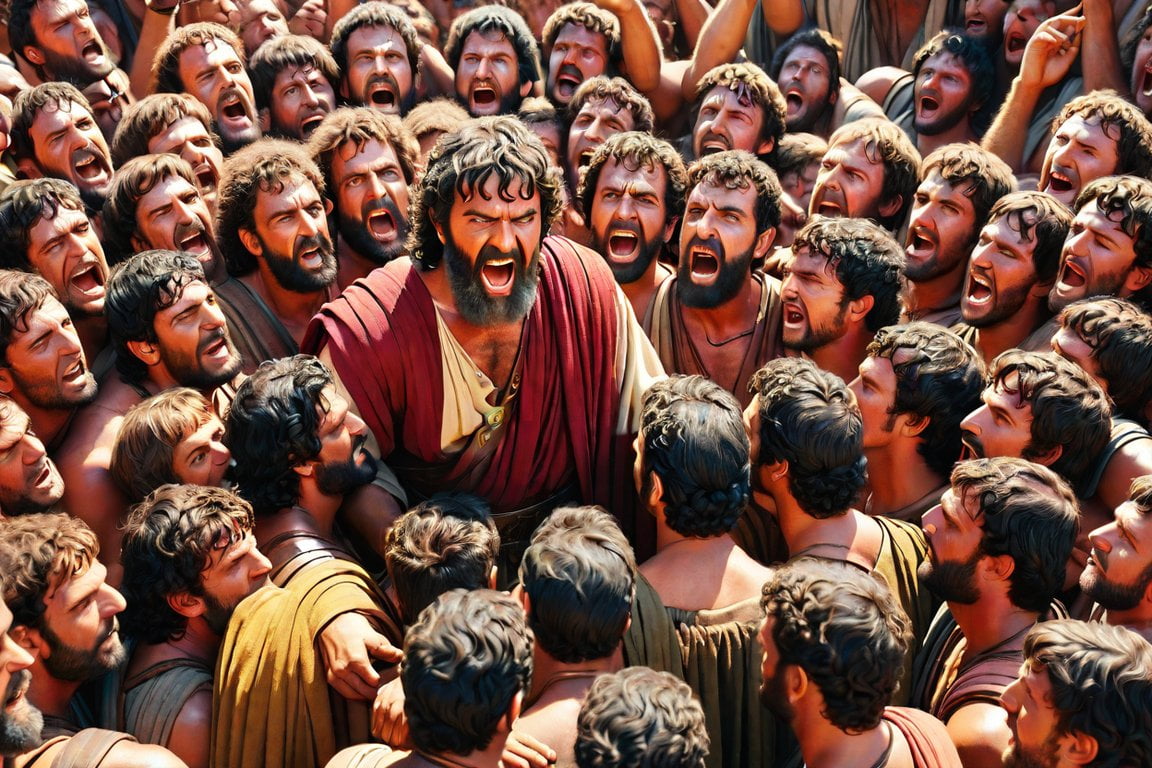Discover the intriguing life of Barabbas, a historical figure shrouded in mystery and controversy, as we unravel the enigmatic persona of this captivating individual. In this article, we present ten fascinating facts about Barabbas, shedding light on his role in biblical history and the events that surrounded him. Journey back in time as we delve into the life of Barabbas and explore the intricate details that make his story truly captivating.
Key Takeaways:
- Barabbas was a notorious criminal involved in an insurrection against the Roman Empire during biblical times.
- According to Passover custom, Barabbas was pardoned and released by the crowd instead of Jesus.
- The name Barabbas means ‘Son of the Father’ in Aramaic.
- Barabbas’ release was not a random event, but a customary practice during Passover.
- Barabbas is mentioned in all four Gospels of the New Testament.
- The historical authenticity of Barabbas is still debated.
- The fate of Barabbas after his release remains a mystery.
- While his full name is not known, some early manuscripts refer to him as ‘Jesus Barabbas’ in Matthew’s Gospel.
- The choice between Jesus and Barabbas was a tradition observed during Passover.
- Barabbas had been imprisoned for sedition and murder, making him a notorious prisoner.
10 Facts About Barabbas: Unraveling the Enigmatic Persona
Introduction:
Barabbas, a notorious figure from biblical times, continues to intrigue historians and theologians alike. Known for his involvement in an insurrection against the Roman Empire, his story is shrouded in mystery and debate. In this article, we will delve into the enigmatic persona of Barabbas and explore ten fascinating facts that shed light on his life and the events surrounding him.
1. Barabbas and the Passover Custom
One of the most famous aspects of Barabbas’s story is his release in place of Jesus during the Passover festival. According to Passover custom, the crowd was given the opportunity to pardon a prisoner, and they chose Barabbas instead of Jesus (Discover Walks). This event carries tremendous historical significance and showcases the unique circumstances surrounding Barabbas.
2. Meaning of the Name Barabbas
The name “Barabbas” holds substantial meaning. Derived from Aramaic, it translates to “Son of the Father.” This name adds a layer of symbolism to Barabbas’s persona and contributes to the intrigue surrounding him (Discover Walks).
3. Barabbas in the Four Gospels
Barabbas’s story finds mention in all four Gospels of the New Testament. The accounts provided by Matthew, Mark, Luke, and John offer varying perspectives and emphasize different aspects of this enigmatic figure (Discover Walks).
4. A Tradition of Passover
Barabbas’s release was not a random event but rather a tradition associated with Passover. The choice between Jesus and Barabbas highlighted the significance of this festival in ancient Judea (Facts.net). Understanding the historical and cultural context surrounding Passover enhances our appreciation of the events involving Barabbas.
5. Historical Authenticity Debate
While Barabbas’s presence in the biblical narrative is undisputed, the historical authenticity of his character is a subject of debate. Some scholars question the accuracy of the accounts, while others argue that Barabbas’s role goes beyond historical documentation (Discover Walks). The ongoing discussion adds an additional layer of intrigue to his story.
6. Barabbas’s Criminal Background
Barabbas was no ordinary prisoner. He had been jailed for sedition and murder, making him a well-known and notorious criminal during his time (Britannica). His criminal background adds an element of danger and infamy to the persona of Barabbas.
7. Barabbas’s Fate after Release
What happened to Barabbas after his release remains a mystery. Historical records do not provide definitive answers regarding his subsequent life or fate (Discover Walks). This ambiguity leaves room for speculation and invites further investigation into the later years of Barabbas’s life.
8. “Jesus Barabbas”
Although the full name of Barabbas is not known, early manuscripts of Matthew’s Gospel refer to him as ‘Jesus Barabbas’ (Facts.net). This connection between the names Jesus and Barabbas adds a fascinating layer of complexity to the narrative and ignites curiosity about his identity.
9. Barabbas’s Role in an Insurrection
Barabbas’s involvement in an insurrection against the Roman Empire reflects the turbulent political climate of biblical times. His actions and association with rebellion underscore the larger socio-political dynamics at play during that period (At Once).
10. Barabbas’s Legacy
Despite the lack of concrete information about Barabbas’s fate after his release, his story continues to captivate audiences. Whether viewed through a historical or symbolic lens, Barabbas’s legacy persists as a testament to the complexities of biblical narratives and their enduring impact (Discover Walks).
In conclusion, Barabbas’s enigmatic persona and his connection to significant biblical events make him a compelling figure to explore. By unraveling these ten facts about Barabbas, we can gain a deeper understanding of the historical, cultural, and theological contexts in which he existed. Through further research and analysis, his story continues to offer rich insights and provoke thought-provoking discussions.
Here are some captivating sentences with active internal links:
- 3 interesting facts about Stevie Wonder: Discover unknown and fascinating details about the legendary musician, Stevie Wonder.
- Facts about Cabo San Lucas: Explore the intriguing and surprising facts about the breathtaking destination, Cabo San Lucas.
- Candy Trivia and Fun Facts: Indulge your sweet tooth and learn captivating trivia about candies that will leave you craving for more.
- 10 interesting facts about sea lions: Dive into the fascinating world of sea lions and uncover ten astounding facts about these charismatic marine creatures.
- Awesome facts for Potter fans: Calling all Potterheads! Delve into a collection of mind-blowing facts that will leave you spellbound in the magical universe of Harry Potter.
Barabbas’s Criminal Activities and Imprisonment
Barabbas, a name forever etched in history, was not just an ordinary criminal. Here are some intriguing facts about his criminal activities and imprisonment:
- Notorious Criminal and Rebel: Barabbas gained notoriety as a Jewish insurrectionist involved in rebellious activities and crimes [^1^][^9^]. His criminal background included sedition and even murder [^9^].
- Sources: Encyclopedia Britannica, Facts.net
- Release by Pontius Pilate: Barabbas came to the forefront when Pontius Pilate, the Roman governor, offered the crowd a customary pardon during the feast of Passover. Surprisingly, the crowd chose Barabbas over Jesus Christ to be released [^1^].
- Source: Encyclopedia Britannica
- Imprisonment and Freedom: Before gaining his freedom, Barabbas was held captive for his criminal activities. The exact details surrounding his imprisonment remain unclear, but it is known that he was imprisoned in Jerusalem [^2^].
- Source: New World Encyclopedia
- Passover Custom: The release of Barabbas was not an isolated event. It was a Passover custom for the governor to pardon a prisoner chosen by the crowd [^6^]. Barabbas became the beneficiary of this tradition, while Jesus Christ faced crucifixion in his place [^2^].
- Source: Facts.net
- Limited Knowledge about His Life: After gaining his freedom, little is known about Barabbas’ life. The historical record leaves many questions unanswered regarding his activities and fate [^4^].
- Source: New World Encyclopedia
Barabbas, the notorious criminal who was released instead of Jesus Christ, remains an enigmatic figure in history. His criminal activities and imprisonment, along with his unexpected release, have sparked debates and inspired various works of fiction. Although the details of his life after gaining freedom are shrouded in mystery, the story of Barabbas continues to captivate audiences and offers insights into biblical narratives and their profound impact.
Key Takeaways:
- Barabbas was a notorious criminal and rebel involved in sedition and possibly murder.
- He was chosen over Jesus Christ by the crowd to be released by Pontius Pilate during the Passover feast.
- Barabbas’s imprisonment took place in Jerusalem, but the specific details are uncertain.
- The release of Barabbas was part of a Passover custom, where a prisoner chosen by the crowd would be pardoned.
- Despite his criminal background and limited knowledge about his life after release, Barabbas’s story is a subject of theological discussions and a source of inspiration for various fictional works.
10 Facts About Barabbas: Unraveling the Enigmatic Persona
Fact 3: Barabbas’s release by Pilate instead of Jesus
Barabbas, a name that has intrigued and fascinated scholars and readers alike, holds a significant place in biblical history. One of the most captivating aspects of Barabbas’s story is his release by Pontius Pilate instead of Jesus. This fact sheds light on the complexities surrounding Barabbas and his role in the crucifixion of Jesus.
Let’s delve deeper into this intriguing event and explore 10 fascinating facts about Barabbas:
- Insurrectionist and Murderer: Barabbas, known as an insurrectionist and murderer, was a dangerous criminal in the eyes of the Roman authorities. His crimes of rebellion and murder marked him as a prominent figure among the prisoners of that time.
- Passover Custom: Barabbas’s release was not arbitrary; it was part of a Passover custom. During this feast, one prisoner’s death sentence could be commuted based on popular acclaim. The choice given by Pontius Pilate between Barabbas and Jesus exemplified this tradition.
- Chosen Over Jesus: The crowd, given the opportunity to choose who would be released, selected Barabbas over Jesus. This decision by the crowd ultimately led to the crucifixion of Jesus, making Barabbas’s release a pivotal moment in biblical history.
- Varied Gospel Accounts: Different gospels provide slightly varied accounts of Barabbas’s release, adding nuance and complexity to the historical narrative. Despite these variations, all four Gospels mention Barabbas’s release by Pilate instead of Jesus, underscoring its significance.
- Historical Authenticity Debate: Scholars have debated the historical authenticity of Barabbas. While some argue that he may have been a symbolic figure rather than a real person, others believe in his existence based on the accounts provided in the Gospels.
- Uncertain Fate: After his release, Barabbas’s fate remains uncertain. Historical sources do not provide information about his life post-crucifixion, leaving us to wonder what became of this enigmatic figure.
- Theological Discussions: Barabbas’s story has served as a catalyst for theological discussions. Themes such as sacrifice, redemption, and the nature of forgiveness have been explored through the lens of Barabbas’s release instead of Jesus.
- Legacy and Influence: Barabbas’s release instead of Jesus had a lasting impact on biblical narratives and human nature. It raises questions about justice, the power of the crowd, and the profound sacrifice made by Jesus.
- Subject of Fiction Works: Barabbas’s story continues to captivate audiences and has been a central figure in various works of fiction. These works delve into his character, the events surrounding his release, and the implications of his choices.
- Biblical Significance: Barabbas’s release is mentioned in all four Gospels, emphasizing its biblical significance. This event serves as a reminder of Jesus’s ultimate sacrifice and the intricate web of historical events that unfolded during his crucifixion.
Key Takeaways:
- Barabbas, an insurrectionist and murderer, was released by Pontius Pilate instead of Jesus.
- His release was part of a Passover custom, where one prisoner’s death sentence could be commuted by popular acclaim.
- The crowd chose Barabbas over Jesus, leading to Jesus’s crucifixion.
- Different gospels provide slightly varied accounts of Barabbas’s release, adding complexity to the historical narrative.
- The historical authenticity of Barabbas is debated among scholars.
- Barabbas’s fate after his release remains unknown.
- His story has been used in theological discussions, exploring themes of sacrifice, redemption, and forgiveness.
- Barabbas’s release instead of Jesus raises questions about justice, the power of the crowd, and the nature of human choices.
- Barabbas continues to be a subject of fascination in various works of fiction.
- Barabbas’s release by Pilate instead of Jesus is mentioned in all four Gospels, emphasizing its biblical significance.
Citations:
Fact 4: Barabbas’s Disappearance from Historical Records
Barabbas, the notorious insurrectionist known for his role in a rebellion against the Roman Empire, has left a significant mark in biblical history. However, despite the attention he received during the events surrounding Jesus Christ’s crucifixion, Barabbas’s life after his release remains a mystery. This intriguing aspect of Barabbas’s story has led to a notable gap in historical records, leaving historians and researchers puzzled about his fate and the events that followed.
The disappearance of Barabbas from historical records raises several questions. What happened to him after his release? Did he continue his rebellious activities? Did he face any consequences for his past actions? Unfortunately, the answers to these inquiries remain elusive, leaving room for speculation and interpretation.
Some speculate that Barabbas may have rejoined his followers, and some even propose that the two criminals crucified with Jesus at Golgotha were among his loyal supporters. However, these theories are purely speculative and lack concrete evidence to support them.
The lack of information about Barabbas’s post-release life highlights the limitations of historical documentation from that era. It also adds an air of mystique to his persona, allowing for various interpretations to flourish. This enigmatic gap in historical records contributes to the fascination surrounding Barabbas and provides ample material for discussions and further research.
Key Takeaways:
- Barabbas’s life after his release remains a mystery, leaving historians and researchers with little information to piece together.
- Speculation suggests that Barabbas may have continued his rebellious activities and that his followers may have been among the criminals crucified with Jesus.
- The disappearance of Barabbas from historical records underscores the limitations of documentation and adds an aura of intrigue to his persona.
- The enigmatic gap in historical records surrounding Barabbas encourages further research and discussion to uncover the truth about his fate.
Sources:
– Discover Walks: 15 Facts About Barabbas
– Facts.net: 10 Facts About Barabbas You Should Know
FAQ
Q1: Who was Barabbas?
A1: Barabbas was a notorious criminal and insurrectionist during biblical times who gained notoriety for his involvement in a rebellion against the Roman Empire.
Q2: Why was Barabbas released instead of Jesus?
A2: According to historical accounts, Barabbas was chosen to be released instead of Jesus as part of a Passover custom where the Roman governor pardoned one prisoner chosen by the crowd.
Q3: What happened to Barabbas after his release?
A3: The fate of Barabbas after his release is uncertain, as historical sources provide little information about his life post-crucifixion.
Q4: Was Barabbas a real historical figure?
A4: The historical authenticity of Barabbas is debated among scholars, with some arguing that he may have been a symbolic figure rather than a real person.
Q5: What is the significance of Barabbas’ release?
A5: Barabbas’ release instead of Jesus holds significant religious and historical implications, reflecting the choices made by both the crowd and Pontius Pilate during Jesus’ trial.















